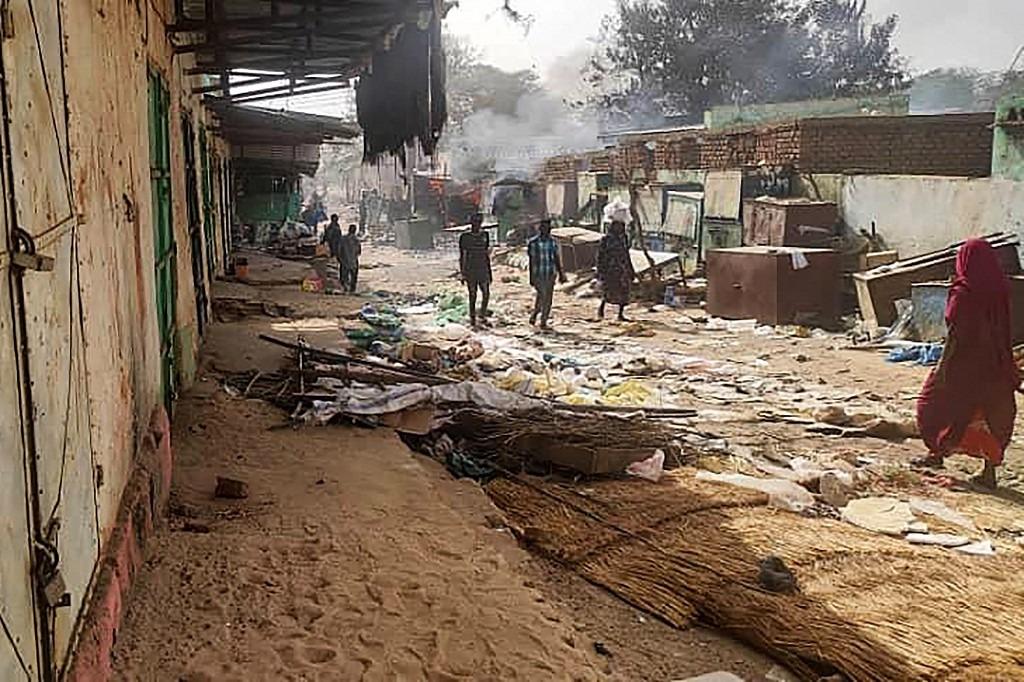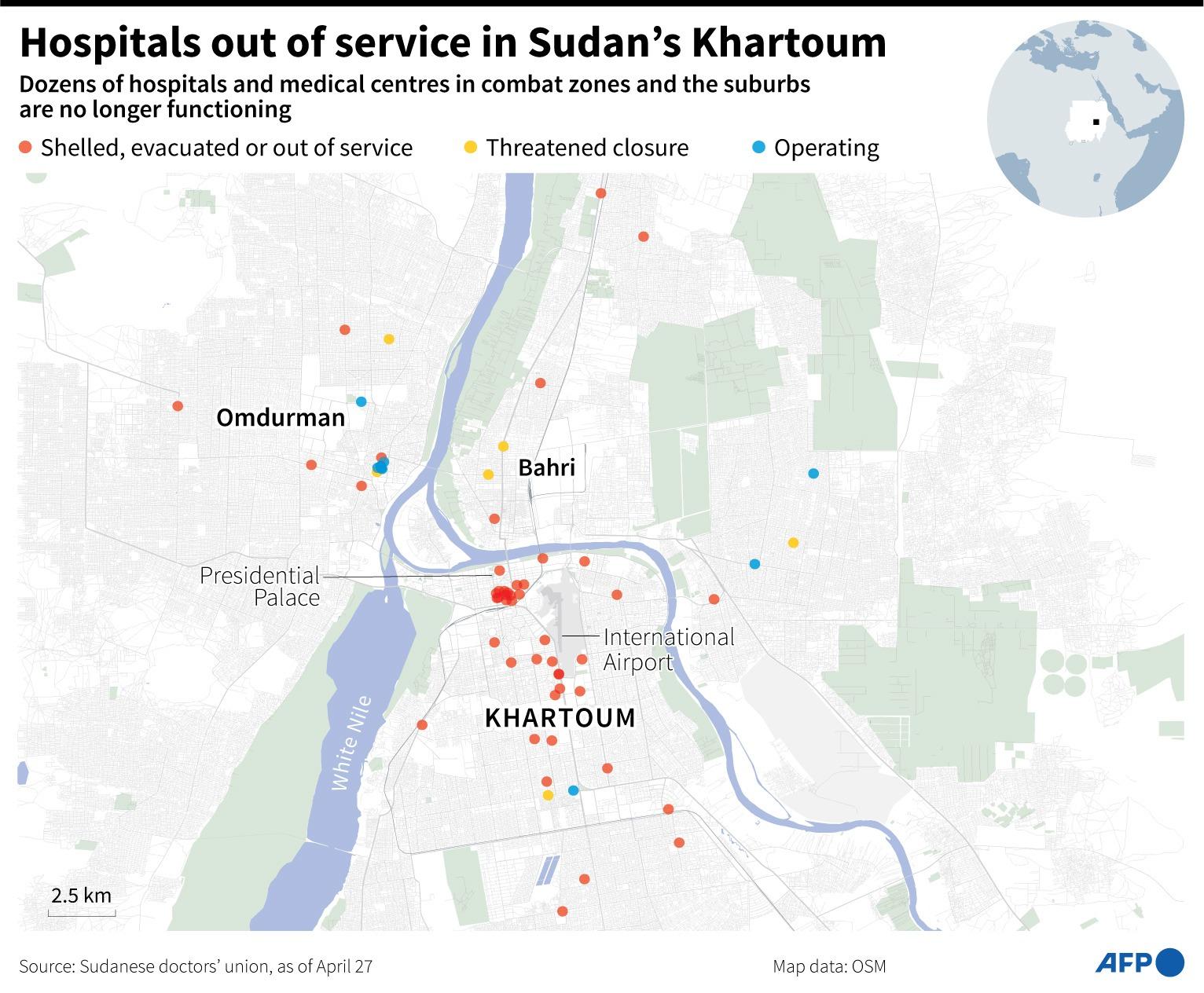 People walk among scattered objects in the market of El Geneina, the capital of West Darfur, as fighting continues in Sudan between the forces of two rival generals, on April 29, 2023. (PHOTO / AFP)
People walk among scattered objects in the market of El Geneina, the capital of West Darfur, as fighting continues in Sudan between the forces of two rival generals, on April 29, 2023. (PHOTO / AFP)
KHARTOUM - Air strikes and artillery rocked Khartoum on Saturday as Sudan entered a third week of fighting between rival military forces despite a ceasefire, prompting more civilians to flee and renewed warnings of wider instability if the war is not stopped.
By Saturday evening, heavy clashes could be heard near downtown Khartoum, close to the army headquarters and the presidential palace.
In one of the latest efforts by foreign governments to evacuate their citizens and others, a US-government organized convoy arrived at the Red Sea city of Port Sudan on Saturday, evacuating US citizens, local staff and others, US State Department spokesperson Matthew Miller said.
The fighting has pitched Sudan towards a civil war, derailing an internationally-backed transition aimed at establishing a democratic government and sending tens of thousands of people fleeing into neighboring countries
The US government will help evacuees travel on to Jeddah, Saudi Arabia, Miller added. He did not say how many Americans remained in the country.
A UN envoy earlier offered a possible glimmer of hope for an end to the fighting, saying the warring sides that have so far shown no sign of compromise were now more open to negotiations - though no date had been set.
ALSO READ: Unending 'hell': Sudan war rages despite truce pledges
Hundreds of people have been killed and thousands wounded since April 15 when a long-simmering power struggle between the army and the paramilitary Rapid Support Forces (RSF) erupted into conflict.
The fighting has pitched Sudan towards a civil war, derailing an internationally-backed transition aimed at establishing a democratic government and sending tens of thousands of people fleeing into neighboring countries.
The army said in a statement it had conducted sweep operations and clashed with RSF troops in northern Bahri and in Omdurman, across the Nile from Khartoum, and destroyed 25 vehicles of RSF reinforcements. It said several banks and stores across the capital had been looted.
Eyewitnesses told Reuters they saw army drones targeting RSF soldiers near one of the country's main oil refineries north of the capital.
ALSO READ:Sudan's army: Paramilitary forces hit Turkish evacuation plane
The sides have continued to battle during a series of ceasefires mediated by foreign powers, notably the United States. The latest 72-hour truce expires at midnight on Sunday.
"I'm afraid that one day I'm asleep and I wake up to a bomb falling on my house," said a man named Khalid, speaking to Reuters from Khartoum where he has stayed because his elderly grandmother and ill sister would suffer on the long and costly trip out.
"That's my deepest fear right now. That's all that I think of. That's why I can't sleep at night."
The RSF said in a statement on Saturday it had shot down an army warplane in Omdurman, and accused the army of violating the ceasefire with an attack there. The army did not immediately respond to a request for comment. Reuters could not independently verify the RSF report.

The army has previously blamed the RSF for violations.
For periods on Saturday, violence was less intense in the capital area than in recent days, residents said.
Residents also reported relative calm in the city of El Geneina in the western Darfur region after days of fighting there. The Darfur Bar Association said the death toll had reached 200, with thousands wounded.
The prospects for negotiations between the army and paramilitary have so far seemed bleak.
On Friday, army leader General Abdel Fattah al-Burhan said he would never sit down with the RSF's "rebel" leader, referring to General Mohamed Hamdan Dagalo, also known as Hemedti. The RSF chief in turn said he would talk only after the army ceased hostilities.
ALSO READ: Sudan's factions agree to extend truce but fighting goes on
Nonetheless, the UN special representative in Sudan, Volker Perthes, told Reuters he had recently sensed a change in the sides' attitudes and they were more open to negotiations, and were saying they would accept "some form of talks".
"The word 'negotiations' or 'talks' was not there in their discourse in the first week or so," Perthes said.
'This war cannot continue'
Perthes said the sides had nominated representatives for talks which had been suggested for Jeddah, or Juba in South Sudan, though he said there was a practical question over whether they could get there to "actually sit together".
The immediate task, Perthes said, was to develop a monitoring mechanism for ceasefires.
"They have both accepted that this war cannot continue."
At least 528 people have been killed and 4,599 wounded, the health ministry said. The United Nations has reported a similar number of dead, but believes the real toll is much higher.
More than 75,000 people had been internally displaced by the fighting, the United Nations reported.
READ MORE: WHO warns of Sudan biohazard as lull in fighting allows more to flee
Foreign governments have organized a major evacuation of expatriates, some by land and sea, and some by air.
Egypt said on Saturday it would stop running evacuations out of the Wadi Seidna base north of Khartoum, a day after Turkey said an evacuation plane was shot at.
Former Sudanese Prime Minister Abdalla Hamdok, speaking at a conference in Nairobi, said the war must stop, warning of its ramifications not just in Sudan but for the region.
"This is a huge country, very diverse ... I think it will be a nightmare for the world," he said. "This is not a war between an army and small rebellion. It is almost like two armies – well trained and well armed."


